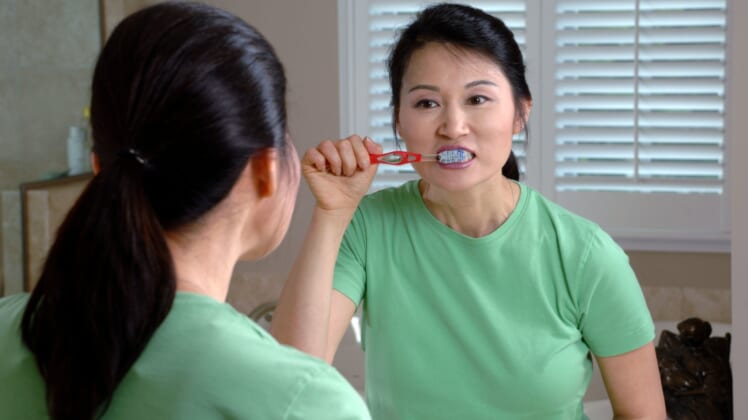Preventing Cancer through Oral Hygiene

Growing up, you probably lost count of how many times your parents told you to brush your teeth. Not wanting them to get yellow or grimy, you listened and hopefully made it a daily habit. While you certainly should take care of your teeth for beauty purposes, it actually has significance for preventing diseases too. In fact, new research suggests that there might be a link between oral hygiene and cancer.
In this study led by Jean Wactawski-Wende from the University at Buffalo in New York, the researchers focused on the correlation between gum infections and cancer. They used data from over 65,000 women who had taken health surveys between the years 1999 and 2003.
In their observations, the researchers discovered that many of these women had developed cancer after one decade, a whopping 7,000 cases to be exact. Specifically, the data showed that women with periodontal disease had a significantly increased risk for several types of cancer.
Of these, cancer in the esophagus rose sharply with the onset of periodontal disease. In fact, women with these gum infections tended to get cancer of the esophagus three times more than the average.
In addition, these women increased their cancer risk by 31 percent for lung cancer, 13 percent for breast cancer, 23 percent for skin cancer, and an astounding 73 percent for gallbladder cancer. The link is almost overwhelming.
According to Wactawski-Wende, the researchers can’t explain exactly why cancer may occur from poor oral health. Clearly, though, people should be putting it high on their priority list.
How to Become an Organ Donor and Why it’s Important
Oral Health and Other Diseases
Cancer isn’t the only result of poor oral hygiene either. According to the Mayo Clinic, some studies have found a link between periodontal disease and heart disease.
These studies have discovered that people with poor oral health often have an increased thickness of the blood vessels in their neck. In turn, these thickened blood vessels could lead to decreased efficiency in blood flow and, eventually, heart disease.
At the same time, the American Heart Association does not yet recommend oral health as a way to prevent heart disease. Researchers may need more direct evidence to prove the link between the two.
However, the Mayo Clinic states that research does prove a link between diabetes and heart disease. Because diabetics often have raised glucose levels, the excess glucose can encourage bacterial problems in their mouths.
In fact, diabetics often benefit from professional oral cleanings. Though indirect, this does suggest that oral health and chronic diseases may be connected.
Good Oral Hygiene
Now that you know the importance of good oral hygiene, you are probably ready to get brushing. Before you do, you should make sure that you’re brushing the right way in order to effectively fend off potential diseases.
- How many times a day are you brushing?
While mornings or evenings may get rushed, you should still make cleaning your teeth a priority. Make sure to brush at least 2 times every day with a fluoride toothpaste and soft-bristled toothbrush.
2. Are you brushing thoroughly?
Give yourself enough time to brush your teeth thoroughly, at least several minutes. Then, make sure that you’re angling the toothbrush slightly at your gums. When brushing, make sure to get the inside and outside as well as your tongue and the section of teeth where you directly bite into your food.
3. Are you flossing?
Again, this process may take more time, but flossing keeps the area closest to your gums clean and healthy. Start by wrapping a long strand of dental floss around fingers from both hands.
As you go, gently slide the floss in between your teeth and take time to rub it up and down against the sides of each tooth. As you repeat, continue unwinding the floss from your fingers to give you a fresh section. If needed, you can buy pre-threaded flossers, a dental pick, or a plaque remover to help make the process easier.
4. How are you storing your toothbrush?
Finally, do not keep your toothbrush covered on a regular basis. While many people use covers to protect the brush, the cover can encourage bacteria and mold growth. Also, change out your toothbrush every two to three months.
Preventing chronic diseases can be as simple as taking the proper care of your teeth. In recent years, several studies suggest that periodontal disease may have a connection to heart disease and now even cancer. Although scientists may need more research to figure out the exact reason for this link, you can easily take the necessary prevention steps now. In the end, you’ll be rewarded with good health and a beautiful smile.
